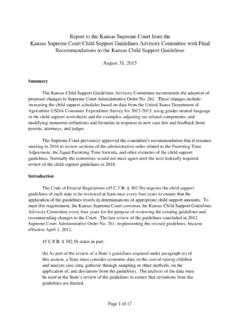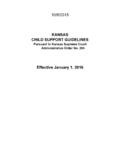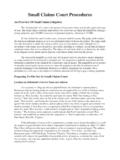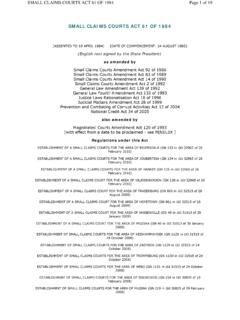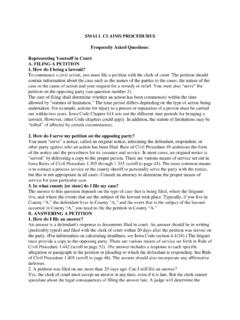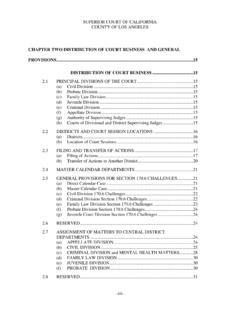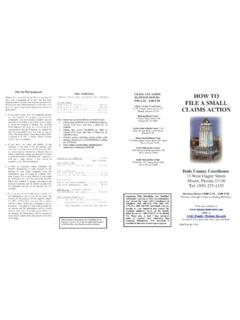Transcription of small claims procedure - kscourts.org
1 INDEX WHO CAN BE SUED IN small claims Pg. 1 RESTRICTIONS ON claim AMOUNTS Pg. 1 FILING FEES Pg. 1 OTHER LEGAL OPTIONS Pg. 1 HOW DO I FILE A claim Pg. 2 WHERE SHOULD I FILE A small claim Pg. 2 WHAT HAPPENS AFTER THE PETITION IS FILED Pg. 3 WHAT IF YOU ARE BEING SUED IN small claims court Pg. 4 WHAT SHOULD THE PLAINTIFF DO IF THE DEFENDANT SETTLES THE DISPUTE BEFORE TRIAL Pg. 4 TRIALS Pg. 4 HOW DO I APPEAL THE JUDGE S DECISION Pg. 5 HOW DO I COLLECT MY JUDGMENT Pg. 5 GARNISHMENT procedures Pg. 6 LEGAL TERMS YOU SHOULD KNOW Pg. 8 small claims procedure 7th Judicial District Douglas County District court July 2006 small claims procedures This brochure will help you decide whether to use a Kansas small claims court to assist you in resolving a problem.
2 It describes the procedures used in the Seventh Judicial District (Douglas County). procedures may vary from county to county. The court cannot guarantee your success, nor will it collect judgments for you. Neither court personnel nor the judge can give you legal advice about a small claims case. Who can be sued in small claims court ? You may sue any person or business you believe owes you money or property except a state or other governmental unit. Are there restrictions on the amount of my claim ? claims may not be greater than $4,000, plus interest, costs, and any special damages or penalties provided by law. Who may sue in small claims court ? You must be 18 years of age to file, or it may be filed on behalf of a minor by an adult representative. Any business other than collection agencies may use small claims court . No one can file more than twenty (20) cases during one calendar year (January 1 - December 31).
3 What is the filing fee? The filing fee for a claim of $500 or less is $30. The filing fee for a claim of $ - $4000 is $50. What legal options are open to me besides small claims court ? If you have a complex case or one that involves a claim of more than $4,000, you may wish to consult an attorney about other forms of legal action. An attorney can tell you what these other actions will cost and can help you decide what course is best for you. 1 How do I file a claim ? To file a case, you must fill out a petition which states your name and address, the name and address of the person you are suing, the amount of money you claim or the property you seek to have returned to you, and the reasons you are asking for the money or property. Your petition must be filed in the office of the Clerk of the District court . When you go to the clerk s office to file your petition, you should bring with you the required filing fee and you should know the following information: 1.
4 The exact amount you want to recover, including interest you claim is owed. 2. The exact description of property you seek to recover. 3. The name and address of the person you are suing, or if a business, the exact name and address of the owner of the business. 4. A description of the incident or event which gave rise to your claim . If you decide to use the small claims procedure , you may obtain forms from the Clerk of the District court . You may fill out the petition and summons at the clerk s office or you may take the forms home to complete and file later. The petition must be typed or printed legibly in black ink and must be signed in front of a notary public or deputy clerk of the district court . You should have proof of identification at the time of signing. An original and two (2) copies must be filed. You will be charged for copying expenses if an insufficient number of copies are furnished.
5 The person you sue cannot be served with a summons at work unless you have filed an affidavit stating that the defendant is a nonresident of Kansas but employed in Kansas, or that you do not know the defendant s place of residence. The sheriff must be able to locate the person to be sued so he or she can be legally served with the summons to appear in court . It is your responsibility to provide the correct addresses on the forms. *The court will only have jurisdiction to hear the case if the defendant is actually served. The filing fee will NOT be refunded even if service is not obtained. Where should I file a small claim ? 2 If you are suing a Kansas resident, you may file your case in the district court of the county in which: 1. The defendant lives; 2. You live, if defendant is served there;* 3. The defendant works, if defendant is served there;* 4. The property to be recovered is located if the action is to recover the possession of property; 5.
6 The estate of a decedent is being probated if: (a) The decedent would have been a co-defendant, and (b) A claim has been duly exhibited in the probate proceeding; 6. The incident about which you are suing occurred if the defendant resided in that county when the incident arose. If you are suing a Kansas corporation or a foreign corporation qualified to do business in Kansas, you may file your case in the district court of the county in which: 1. The defendant has a registered office; 2. The defendant is doing business at the time the suit is filed; 3. The county where the incident about which you are suing occurred; 4. The property to be recovered is located if the action is to recover the possession of property. If you are suing someone who does not reside in Kansas or a corporation not qualified to do business in this state, you may file your case in the district court of the county in which: 1.
7 You live; 2. The defendant can be and is served;* 3. The defendant is doing business at the time your case is filed; 4. The property to be recovered is located if the action is to recover the possession of property; 5. The defendant has property; or 6. The incident about which you are suing occurred. What happens after the petition is filed? A trial date will be set at the time the petition is filed. The sheriff will attempt to serve the defendant at the address you ve provided on your petition and summons. If the defendant cannot be located, the trial will be canceled. If you subsequently find another address where the defendant may be served, you must fill out an alias summons (second summons) and the sheriff will then try to serve the defendant again. 3 What if you are being sued in small claims court ? If you are sued and you agree that you owe the other party money or property, you may pay what you owe or return the property and you will not have to appear in court .
8 Be sure that the court is notified in writing of any settlement of the suit. If you do not settle the claim against you before the trial date, you must appear in court at the scheduled time or the judge can rule against you. If the judge rules against you, you will have a legal obligation to pay what the judge orders you to pay. However, you may appeal the judge s decision (see p. 5). If you have a claim against the plaintiff in connection with the same matter, you may file a counterclaim. You may do this by filling out the defendant s claim form that comes with the summons and return it to the office of the Clerk of the District court as soon as possible. You may be responsible for additional court costs if your claim is more than the amount authorized for the original filing fee. What should the plaintiff do if the defendant settles the dispute before trial? If the defendant pays your claim before the trial, you must notify the court in person or in writing.
9 A dismissal form will be sent to you and you must sign and return it to the court . Trials In case of an emergency, the judge may grant a change of the date of trial. The party who is seeking to change the date must contact the court and request the change. Whether or not a continuance (change in date) is granted is entirely within the discretion of the judge. Parties should report to the hearing. Each case is allotted 15 minutes and trials are conducted informally by the judge. Parties must present their own cases and may not be represented by an attorney. The plaintiff has the burden to prove that he or she is entitled to prevail on his or her claim . If a counterclaim is filed, the defendant has the burden to prove he or she is entitled to prevail on his or her claim . Each party should bring to trial all documents, evidence, or other proof necessary to prove his or her claim . Examples of evidence include: - Witnesses - Contracts - Photos - Receipts - Bills 4 It is each party s responsibility to summons to court the witnesses necessary to present his or her case.
10 If the attendance of a witness cannot be arranged by agreement with the witness, you may file a written request to have a subpoena issued for that witness. The written request must be filed with the Clerk of the District court at least eight (8) working days prior to the date of the trial and must be accompanied by a check for $ plus mileage from the witnesses home to the courthouse, made payable to the witness. The judge may not consider the written statements of witnesses who are not present at trial. Judgment will be rendered by the judge after both parties have had an opportunity to present their cases. If the defendant does not appear, plaintiff may be granted a default judgment. If the plaintiff fails to appear, the court may dismiss the case. If a defendant s claim has been filed, the defendant may be granted a default judgment against the plaintiff if the plaintiff fails to appear. How do I appeal the judge s decision?




